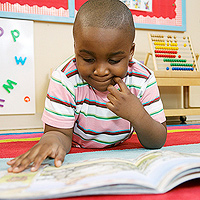Parents.com recently posted the following helpful article on what to expect in terms of learning levels in kindergarten!
What Your Kid Will Learn in Kindergarten
It’s your child’s first official year of school, and you’ll be amazed by how much she flourishes in kindergarten. How can you help your child succeed from her very first school day? Help her build self-confidence when it comes to learning; by being her biggest cheerleader you’ll instill a love of learning that will last throughout her life and will help her meet specific goals each year. There will be focus throughout this year on mastering letters, sounds, and words. You’ll watch with delight as she takes her first steps toward reading and writing correctly, especially when those activities are linked, both at school and at home.
Help your kindergartner have fun with language in everyday life this year and watch as her vocabulary explodes. She will learn key fundamentals of math this year, too, and there will be countless ways (no pun intended) to encourage this. Educational standards vary across states, districts, and schools, and no two children learn at exactly the same rate, so don’t panic if your little one doesn’t start to read at the same time as the neighbor’s kid. Here are the important learning milestones children will typically achieve in kindergarten, with tips for helping your child stay on track at home.
Letters and Sounds
At School: By the end of kindergarten, kids will be able to recognize, name, and write all 26 letters of the alphabet, both uppercase and lowercase. They will know the correct sound or sounds that each letter makes and they will be able to read about 30 high-frequency words — also called “sight words” — such as and, the, and in.
At Home: Keep reading aloud to your child. “Reading to your children at home not only makes them enjoy reading, but it also helps them in school,” says Susan Quinn, a reading specialist and elementary school teacher at Saint Brendan School in the Bronx, New York. Reading together nurtures companionship and fun and builds concentration, focus, and vocabulary. Look for books about your child’s particular interests and get suggestions from the librarian, but make sure the books are not too hard. “It’s always better to start them on easier books, because then they feel successful, and that spurs them on, so they’ll read more,” Quinn says. Dr. Seuss books, with their rhymes and simple words, are perfect for this age, Quinn says. Kids learn through repetition, so read the same favorite books over and over, ask questions, and encourage your child to say simple words aloud. Throughout the day, have her say the words she sees on street signs, billboards, and computer screens, or have her search for high-frequency words in a magazine.
Writing
At School: In class, kids will be taught to write simple CVC (consonant, vowel, consonant) words, such as hat, red, and dog. They will also write short, simple sentences such as “The cat ran home.”
At Home: Keep a special box or bin at home filled with writing materials (crayons, pencils, markers, paper, and notepads) so your child can practice writing simple sentences about special things he’s done or seen during the day. Ask about what he’s written, and have him read it aloud. Offer encouragement by displaying his writings on the refrigerator or on her bedroom wall.
Numbers and Counting
At School: Kids this age will learn to recognize, write, order, and count objects up to the number 30. They will be able to add and subtract small numbers (add with a sum of 10 or less and subtract from 10 or less); this focus on addition and subtraction will continue through second grade.
At Home: Get your kindergartner to look for the numbers one through 30 in magazines and newspapers. He can cut them out, glue them on paper, and put them in order. When you’re riding in the car or waiting in line, play a game of “What comes next?” Give your child a number and ask him to identify the following number. At bedtime, ask him to count how many stuffed animals he has, and ask, “How many books about dogs do you have? How fast can you count them?” Take two of these books away and ask, “How many are left?”
To continue reading this article, click here.
